Jimmy Page and the Black Crowes “Live at the Greek” The Orchard
- Performance:

- Sound:

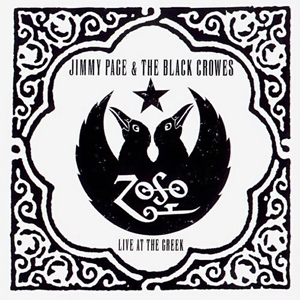
I’ve lamented the premature decline of the Black Crowes at this site before. They’re like the Mike Tyson of Rock and Roll. Started out like a house on fire, and then flamed out way before their time in a haze of bloated musicality and dysfunction. We still have those first three records to remind us of the way things were like a compendium of Tyson’s greatest early knockouts. It’s frustrating because the Crowes, at least, could still do it if the chips were down. Some would say they still do. To them, I would say “put the bong down and clean your ears out.” Nostalgia can cloud the senses as adequately as nature’s herb. I understand. I miss them as well. But there are more than a handful of rockers out there that could hand them there ass at this point, and it’s been that way for a while now. I’m of the opinion that they’d already lost it as far back as the late ’90’s. But then Jimmy Page hopped onstage with them for a minute. And the Rock rose from the ocean of mediocrity like the Kraken on speed. And they finally had the good sense to put Live at the Greek out on vinyl some 13 years later. When you’re not moving forward, you can look to the vault, I reckon. Better late than not at all.
Gosh, this stuff is good. If we’re gonna ride the boxing metaphor a bit longer, we can talk about how Page hits you with shots from the strangest of angles. You think he’s gonna zig and he zags. He’s a bit wild, doesn’t seem to have much of a fight plan, and does whatever circumstances require. And, God knows, he’s here to go the distance. All of that’s on display over the course of these three discs. And these boys didn’t take on any bums for this set either, just the contenders. I mean, they could have sought out some of the “strummier” material from the Led Zeppelin oeuvre, but instead they hit you with body blows like “Sick Again,” and “Nobody’s Fault But Mine.” They go for the head on “Shapes of Things,” and “Whole Lotta Love.” And the Crowes, to their everlasting credit, were world class sparring partners. They whipped themselves into prime fighting shape for this match. Of course, the Crowes have always done just fine with their heroes’ material. I suspect they can still pummel a mean cover into submission. Folks are rough on cover bands (I know I am), but most of the great groups started out that way. The Black Crowes just seem stuck in reverse. I saw them a few years back, and the bulk of their set was made up of covers. I guess it’s been longer than I realize because this was the era wherein Marc Ford had rejoined the band. I got up for that one, man, but I left the amphitheater unfulfilled. That was a long tedious fight without much action. The same cannot be said of the Greek material.
I actually bought this CD used a while back. It came with extra candy. Videos and the like. None of that is found on the vinyl set. No downloads, crappy inner sleeves, pedestrian vinyl. Furthermore, the sounds a bit thin. Not bad, but it suggests the power of the performances rather than detailing it. And I still recommend it. The content is that strong. Nobody wants to like the Black Crowes more than I do. This one reminds me why. I needed it.
(This record was purchased at MusicDirect.com.)
The Raconteurs “Live at the Ryman Auditorium” Third Man Records
- Performance:

- Sound:

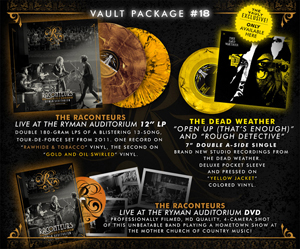
I got so juiced on the Crowes/Page set that I went all in on the Guitar God Rock for this month. That’s a little easier to do when you belong to Jack White’s record club. He knocked one into next week with the latest installment from The Vault. Specifically, he revisited a live set from Nashville in 2011 by the Raconteurs. Rumor has it that they’re working on new material. Sooner the better, I say. Perhaps this set is a primer for what’s in the pipeline? Regardless of whether or not that turns out to be prophetic, Live at the Ryman Auditorium stands on its own as a fine document of what that band can do. What they can do is rock. Early and often. And it doesn’t hurt to have a Queen of the Stone Age sitting in on keys and, less often, guitar. Dean Fertita is the name. That guy gets good jobs. And he gets the job done on this one. Him and the rest of the gang. I’ve not caught them live yet, but I intend to remedy that at the next available opportunity.
I’ve been lead to believe that the Raconteurs are known to play some zany covers on the concert stage. That’s not the case on Ryman. This is a full set of originals spanning the band’s two studio releases. Maybe Third Man Records didn’t want to cut through the red tape necessary to release covers on this set. Maybe the Raconteurs material is strong enough to stand on its own, thanks. In actuality, there’s no “maybe” about it. Jack White’s harmonies are a little off on “Consoler of the Lonely.” Brendan Benson sounds a little out of his depth at times, like he’s really working to stay afloat. And sometimes, with the help of the Greenhornes rhythm section, all five players lock in like a frigging bear trap and slay whatever presents itself to them in the moment. From start to finish, warts and all, this set is an honest to goodness good time rocker. I’m most familiar with the material from the band’s debut record, Broken Boy Soldiers. I have a digital copy of Consolers of the Lonely that hasn’t gotten much play in my house for obvious (i.e. digital) reasons. I also remember being a bit uncomfortable with what sounded like some Prog-Rock elements to my ears on that one. All I hear on Ryman is Rock-Rock no matter which of the two records the songs are coming from. Benson and Big Jack aren’t the least bit afraid to alternate vocals within the same song. “Duets,” if you will. That’s never more effective than on “Old Enough” which finds Jack strumming all hell out of an acoustic and screaming like a lunatic. The band stretches out on “Blue Veins” long enough to incorporate the ol’ false ending as Jack’s plugged in and cranked to 11 throughout that one. And I’m an unabashed fan of “Steady, As She Goes.” Always have been, and I don’t see myself tiring of it soon. So there.
The first of these two discs was pressed on “rawhide and tobacco” vinyl (mine almost looks like standard black), the second on “gold and oil swirled” (read “yellow”) vinyl. The set also came with a 7″ from White and Fertita’s Dead Weather band as well as a DVD of the Ryman show’s performance. The forthcoming Vault release has stirred controversy throughout the global community that Big Jack has built for himself. You can read about that elsewhere. From here, I’d recommend that you hit the black market in search of this one. That’s what I’d do.
Paul McCartney “New” Hear Music Records
- Performance:

- Sound:

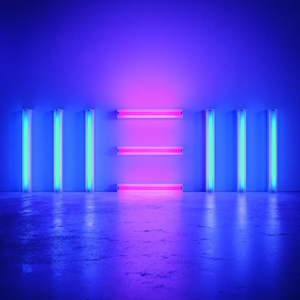
I so enjoyed the classic vibe of these first couple of records that I decided to stay on the train for one more stop. This one’s a little less bombastic than the others. But no less classic. Since it’s by Paul McCartney and all. He calls it New and I don’t blame him. It seems like some of the old timers have finally figured it out. They don’t have to struggle to keep up with what’s happening now; today’s artists should be struggling to match the quality of what came before. (They should try harder.) Sabbath’s last record ranked amongst their best in my book. The Stones’ last studio effort was a little more than listenable, even. While I’m not as familiar with McCartney’s records over the last few years, I can’t imagine that he’d embraced his Beatle-ness as thoroughly as he seems to have on New. Or else I’d have heard about it already. It’s all in here, harpsichords and all, but it is, without doubt, New too. And it will improve the quality of your life.
McCartney’s always been my third favorite Beatle, and, as such, I may have underestimated my esteem for the man. I should have known. A third favorite Beatle still trumps 98 percent of anything else available. Furthermore, I saw the guy play about 40 of his best known songs in a baseball stadium that he brought together so completely that you felt like inviting everyone in attendance home with you afterwards to dissect the experience together. Add his appearance in the Sound City documentary and his recent performance with the surviving members of Nirvana to the mix, and I’d say Sir Paul is enjoying what would be considered a renaissance for most. But I get the feeling that he’s simply doing exactly what he wants, when he wants, and that it’s as effortless for him as tying his shoes. If his shoes had laces. Sound City shows ol’ Paul strolling into a recording studio and constructing a scalding rocker from the ground up over the course of what seems like about two action packed hours. And the melodies and textures throughout New feel just as free flowing and natural. He employs a variety of producers throughout, one of which is George Martin’s son, and the record has an appropriately diverse feel as a result. The song “New” will take you back to the swirling ’60’s while “Appreciate” is planted firmly in the electronic Twenty-Tens. As I understand it, Paul’s had the same band together for about 14 years now which is longer than his tenure as a member of the most influential and revered Rock and Roll band ever. And, as a result, this feels like a true collaboration. The liners don’t tell you who plays what when, and that’s a shame because it’s hard to figure out what’s happening on a recording this detailed and dense. Some folks don’t care, but I’d like to know. Still, this may be the very occasion that the phrase “ignorance is bliss” was meant to describe. I really love this record.
Just like the good old days, New is a single record pressed on heavy vinyl. The sonics are superbly balanced; spread across a soundstage whose sounds that are often suggested more than revealed. A download coupon is included, but I haven’t been able to convince mine to work, but don’t be dissuaded. This was meant to be heard on vinyl anyway. There’s nothing New about that.
(This record was purchased at MusicDirect.com.)
Janelle Monae “The Electric Lady” Bad Boy / Wondaland
- Performance:

- Sound:

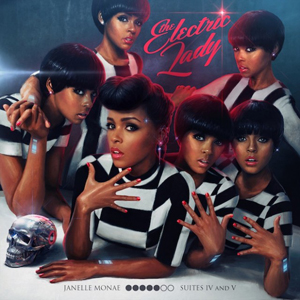
And now for something completely different. I mean it. Even with many of the trappings of modern day Hip-Hop on full display, Janelle Monae’s latest, The Electric Lady, is as innovative and new as you’d expect by now. I’ve enjoyed every installment in her Metropolis narrative so far, but none more than this one. I’ve reached the age where I’m having a hard time remembering how I came to Monae’s work in the first place. Perhaps through her early affiliation with Outkast? Anyway, she’s taken the Outkast outer space aesthetic and pushed it further than anyone could have expected. She’s almost convinced me that she is an actual android. Her talent is certainly otherworldly, and she seems to be visiting from the future. If that’s the case, there’s hope for us yet. This is an impressive batch of tunes.
Even more so than her previous batch. At the very least, these songs are a little more accessible and less cluttered than what we heard on The Archandroid. And I really enjoy listening to The Archandroid. For the uninitiated, Monae’s first three works (including the initial E.P. in the series, The Chase Suite) combine to tell the story of… something. From what I can tell, the story revolves around a robot (if a robot is the same thing as an android) girl who is being pursued by someone for some reason, presumably for the purpose of “retiring” her (if Blade Runner terminology applies across the entire android platform). And, if you can get behind that premise, there’s something in here for every music fan. As long as that fan’s taste is as diverse as Monae’s. “Suite Four” starts with a sonic overture “inspired by the idea of Ennio Morricone playing cards with Duke Ellington.” I love both, but I heard Surf Guitar before I heard Spaghetti Western, and perhaps that’s the true beauty of this work’s scope. The listener’s experience is always dictated by his or her own palette, but The Electric Lady draws from a palette so massive that you’re almost guaranteed to find something you can relate to in here somewhere if you’re listening with the right ears. Of course, the Duke Ellington fan will be imposed upon to at least tolerate Prince (who guests on “Givin’ ‘Em What They Love”) whose fans will have to find an appreciation within their android souls for the ukulele featured in “Dance Apocalyptic.” Of the 19 Electric tracks, five of them are either “overtures” or “interludes.” Of the remaining 14 song, five of those “feature” another artist. These are some of the modern Hip-Hop trappings that were alluded to earlier. Monae’s voice could easily have carried this work across the finish line, but one must be of one’s time, I guess, even if one’s time is 200 years into the future. And this is her party anyway so she can invite anyone she damn well pleases, I reckon. No one gets in the way, and that’s about the best I hope for when it comes to all of this “featuring” business. Clearly, I am not of my time.
The two discs that carry The Electric Lady information sound just fine after a good cleaning. Plenty of funk depth with some air left over for the orchestral arrangements on top. The discs are pressed Third Man Records style, half black and half white. A download coupon is included with the set so you can listen in your spaceship too. I’m pretty excited about this one, and I suspect it will color the way I hear Monae’s previous efforts too. It ties the story together better than Lebowski’s rug did. (I’m sure there’s a Lebowski reference in Electric somewhere. I’ll find it in time.)
(This record was purchased at MusicDirect.com.)
Nat “King” Cole and his Trio “After Midnight” Analogue Productions
- Performance:

- Sound:

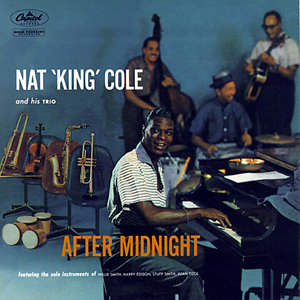
And now back to Earth. After all of this rocking and time traveling, I was ready to decompress with something a little lighter. An organic mixed green salad as opposed to all this sonic steak we’ve been gnawing on. I’d had my eyes on Nat “King” Cole’s After Midnight set as done by Analogue Productions for a while. The price tag scared me. The idea of hearing some of Cole’s vocal music without a bunch of orchestration lured me. That was the promise of After Midnight, and I took the bait. And I was rewarded with a hook in my mouth that’s likely to cost me hundreds in the coming months. We’d previously looked at Cole’s instrumental Penthouse Serenade by AP, and it turned out to be one of my favorite albums ever. Still is. But now it has some extra competition. I’d mentioned recently that I have a hard time accessing the magic of Sinatra’s recordings and postulated that the work might just be too “dated” for my taste. But that theory doesn’t really hold water because I enjoy listening to music from the 1800’s. And this Nat Cole set is blowing my mind. It was originally released in 1957. I bet that was exciting, but I can’t imagine it’s ever sounded this great. Don’t let the price tag scare you. Get hooked. The water’s warm. Sorry, Frank.
Nat Cole could play the piano. If you don’t believe me, get the aforementioned Penthouse record. I’d dallied with a couple of his vocal albums as a younger man, but never had anything that was in particularly great condition so I couldn’t really get into any of it. I knew that he was one of Ray Charles’ biggest influences and that seemed to work out well enough so I decided to keep digging. I struck gold. These Analogue Productions discs are absolutely some of the best available for clarity, quiet, and transparency. That’s true of Dusty In Memphis, their take on Patsy Cline’s Greatest Hits, and Sam Cooke’s Night Beat. But these Nat Cole records seem to exceed all of that somehow. Maybe I just picked the right titles. I sought out Midnight specifically because it featured Cole’s trio along with a handful of soloists, and I picked Penthouse as it featured Cole as the lone soloist. I prefer to hear orchestras when I’m listening to that music from the 1800’s. But I gotta say that I’m probably going back for AP’s The Nat “King” Cole Story, orchestras and all. That’s where this hook in my mouth is likely to take me, and that’s what’s going to separate me from a substantial sum of money. This stuff is so intimate, so lifelike and natural, that I’m willing to swim in that sea of strings. I look forward to it, in fact. But Midnight gives Cole room to spread out on his own. This record’s string section is composed of a bassist and a guitarist. And sometimes they’re augmented by soloist Stuff Smith’s fiddle. And when Cole and Smith engage in some call and response action, the musicianship is enough to make you faint. These recordings will not ever sound better.
How could they? The three 45 rpm, 180-gram discs are flawlessly silent. The original Mono recordings glow with a warmth that is almost extinct today. Every vocal nuance, every brush of the drum skins is shown in the most flattering light imaginable. There are essays, bonus tracks, and photos included. If you’re a Nat Cole fan, or even if you just have a passing interest, this is your time. Pony up.
(This record was purchased at MusicDirect.com.)


